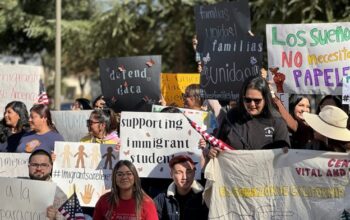Los Angeles politicians have created a MIRACLE. They got union workers, to work for FREE. They got bus manufacturers to give them buses for FREE. Gas companies have agreed to give away all the gas and diesel wanted by the government transit system in Los Angeles. Everything is FREE.
It is so free, that government is going to give away free fares to everybody—no need to pay to get on a bus—it is free.
What idiot thought we were so dumb to think unions will allow workers to drive for free? Or that manufacturers and gas companies will give away their product. NOTHING IS FREE. The taxpayer finances this giveaway. Taxes go up. Instead of gas tax money being uses to fix roads and fill potholes, folks will get FREE bus rides instead. Sadly, the people of Los Angeles are losing productive, taxpaying people—so politicians can use tax dollars to buy votes. No wonder L.A. is a dying city—few are smart enough to know they are being owned by government. After all they get a free bus ride to their minimum wage job!
Los Angeles Turns Toward Free Fares

How far a fareless public-transit program goes will depend on a pilot program debuting in August.
by Claire Wang, American Prospect, 5/12/21
Los Angeles transit officials are taking a radical step to advance transportation equity in a metro area that has the highest percentage of low-income riders in the country.
The COVID-19 pandemic has crushed ridership and strained budgets at the Los Angeles County Metropolitan Transportation Authority. But while many public-transit systems have returned to collecting fares after suspending them early in the pandemic, L.A. transit officials are instead taking a radical step to advance transportation equity in a metro area that has the highest percentage of low-income riders in the country. Over the past year, the authority, known locally as Metro, has put together a blueprint for what could become the largest free mass transit system in the world.
Later this month, the Metro board will vote on a two-phase pilot program that would waive bus and rail fares for students in K-12 schools and community colleges starting in August. Low-income riders making less than $35,000 a year—who comprise 70 percent of Metro’s customer base—would be phased in next January. The proposal, which is endorsed by L.A. mayor and board chair Eric Garcetti, would last through June of 2023. If the experiment is successful, the agency could decide whether to expand free transit access to all Angelenos regardless of income. According to a recent survey, 86 percent of Metro riders and 80 percent of non-Metro riders said they support going fareless.
“We have a moral obligation to research and implement a fareless transit system,” Phillip Washington, Metro’s CEO, told the Prospect. “In the long term, transit should just be like library services or fire department services.”
For most Angelenos, transportation—public transit and private vehicles—is the next-highest household expense after housing. Metro’s current fare is $1.75 for a single ticket, or $7 for a day pass, and the agency estimates that the pilot could save passengers up to $1,200 a year. It could potentially mean savings for the authority as well: Unlike most big-city systems, rider fares account for just a sliver of Metro’s annual revenue. In the agency’s fiscal 2020 budget, the roughly $280 million in fare revenues made up just 4 percent of its $7 billion operating budget. The agency relies primarily on local sales tax revenues and state and federal grants. In New York, by contrast, fare revenues comprise about half of the transit agency’s operating budget. Implementing a free-for-all system would require New York transit officials to identify a much larger infusion of funds to replace those lost revenues.
For most Angelenos, transportation is the next-highest household expense after housing.
Some transit advocacy groups that have long campaigned for fareless transit in L.A. applauded the agency’s commitment to economic justice. But they also expressed concerns about its needs-based enrollment system. “Our position has been that working-class folks don’t want a litmus test for something that should be a human right,” says Channing Martinez, a lead organizer for the Bus Riders Union, which represents more than 500 Metro riders and has been campaigning for fare-free transit for two decades. “To some extent, it’s insulting that you have to prove you’re poor in a city that has billions of dollars and can afford to provide free public transportation to everyone.”
Your donation keeps this site free and open for all to read. Give what you can…
Martinez adds that fare increases and service cuts have disproportionately affected Black and Latino passengers, who comprise the majority of Metro customers. During the pandemic, bus service plunged by 17 percent, leading to overcrowding on the remaining buses and raising the risks of infection. Oscar Zarate, a community organizer with Strategic Actions for a Just Economy (SAJE), an economic-justice advocacy group, said means-tested programs harm accessibility, especially for people from the most marginalized demographics. “These are the people who don’t speak English, who aren’t tech-savvy, who don’t have internet access,” he says.
Metro had already launched a number of reduced-fare initiatives to help low-income passengers. But the benefits are limited—and unhoused and disabled people who lack documentation, such as a W-2 form or pay stubs, to prove that they meet income requirements, are ineligible for the existing programs, according to Sabeerah Najee, a SAJE organizer and a longtime Metro rider who is disabled and works with disability communities. It is difficult for these individuals to register for means-tested programs, she says, because “how can you prove that you don’t make anything?”
Metro officials say they plan on working with community organizations and social services agencies to register residents who may not speak English well or lack the necessary paperwork to document income. In a survey conducted at a Metro town hall in late March, more than two-thirds of the 185 respondents said they would prefer to sign up for the pilot online or by email. The remainder said they would register by phone, mail, or through a social services organization.
Unhoused and disabled people who lack documentation to prove they meet income requirements are ineligible for the existing low-income fare programs.
Despite the pushback from grassroots groups, CEO Washington says Metro is standing by a two-phase rollout structure, which would help the agency weed out uncertainties about security, funding, and sustainability. “If we go systemwide right away,” he says, “there would be no turning back.” The 18-month pilot could cost Metro up to $335 million, but the agency expects significant savings on equipment upkeep and fare enforcement costs. (The savings would add up to about one-third of fare revenues.) “We spend more on [fare collection] than people realize,” Washington adds. “If we go permanent with a fareless system, a lot of that might go away.”
Eliminating fares also reduces the targeting of Black and Latino riders for fare evasion. From 2012 to 2015, Black people made up less than 20 percent of Metro riders but received more than half of all fare evasion citations, according to a 2017 study from the Strategy Center, a progressive think tank based in South L.A. The pilot program could also further reduce bus driver assaults: More than 40 percent of these confrontations stem from fare disputes. Since Metro waived bus fares last spring, reports of driver assaults have plummeted to nearly zero.
Councilmember Mike Bonin, a longtime champion of free public transit, said the pilot is a game changer, but the process of implementing a low-fare rider system—to separate the 70 percent of passengers who make less than $35,000 from the 30 percent who make more—“is very costly and labor-intensive.” Bonin notes that buses and rail remain free. The system implemented a free-for-all transit program on its buses; when ridership nosedived last March, the agency temporarily terminated fare collection altogether. The process has gone smoothly and received positive feedback from customers.
Your donation keeps this site free and open for all to read. Give what you can…
SUPPORT THE PROSPECT Though New York and other large metro transit agencies may not be able to afford to lose fare revenues, there has long been strong interest in eliminating fares in smaller urban areas and college towns. In some ways, L.A.’s pilot program follows a path similar to Kansas City’s original $8 million free-fares initiative, which was designed to be implemented incrementally over a three-year period. Test runs for that program covered veterans, high school students, and domestic violence survivors. “Access to housing, education, health care—all this sits on the foundation of social equity



